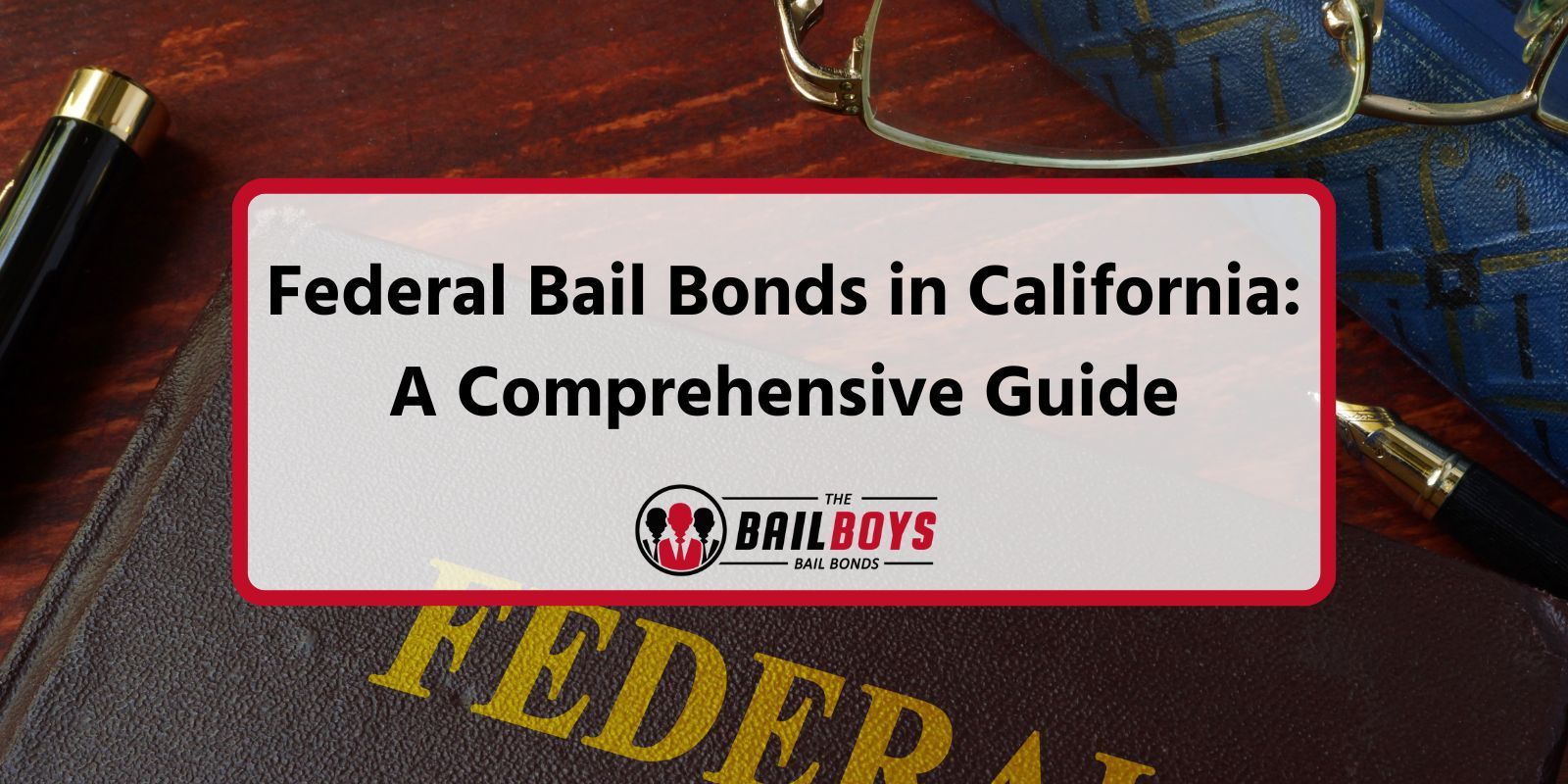
Federal Bail Bonds in California: A Comprehensive Guide
A federal bail bond serves as a financial guarantee to a federal court that a defendant will appear for all scheduled court appearances until their case is resolved. Unlike state bail bonds, which are primarily for crimes charged under state laws, federal bail bonds apply to defendants charged with federal crimes. Federal crimes are offenses that violate U.S. federal laws and are prosecuted by the federal government.
Due to the serious nature of federal charges, the federal bail process is usually more complex and strict compared to state crimes. So, if you have a federal case in California, understanding how the federal bail bond system works will help you take the right steps to secure freedom from jail as fast as possible.
Understanding and handling federal bail bonds can be challenging sometimes. But you don’t have to go through the complex process yourself when our California federal bail bondsman at The Bail Boys can handle it for you. The Bail Boys have been in the bail bond industry for over 20 years, so we have the experience and expertise to help you bail someone out of jail without hassle. Start by booking a free consultation with us, let’s discuss how we can process your bail bond and guide you throughout the process.
This guide will provide you with an overview of the bail bond system at the federal level; how it works, the role of federal bail agents, the consequences for violating federal bail bonds, and alternatives to federal bail bonds.
What are Federal Bail Bonds?

A federal bail bond is a type of bail bond used in federal court cases. It allows a defendant to be released from federal jail while awaiting trial by providing a guarantee financially to ensure the defendant’s appearance in court. Federal bail bonds are typically used for cases involving federal offenses, such as drug trafficking, immigration violations, bank robbery, and white-collar crimes.
The key differences between federal and state bail bonds lie in their jurisdiction and fees. Federal offense fees tend to be higher than state bail bonds due to the more serious nature of federal offenses. The higher amounts are set to ensure that the defendant has a significant financial incentive to appear in court.
Federal courts consider several factors when setting bail for federal cases, including the severity of the offense, the defendant’s criminal history, the potential danger to the community, community ties, and the risk of flight. In California, bail bond agents must be licensed to provide federal bail bonds, and they must adhere to the regulations set forth by federal authorities.
How Does a Federal Bail Bond Work?

- Arrest and Charging: If an individual is arrested and booked for a federal crime, they are held in custody for their initial appearance before a federal magistrate judge.
- Initial Appearance: During the initial appearance, the court tells the defendant about their rights and the charges against them. If the case is eligible for bail, the court may schedule a separate bail hearing, known as a detention hearing, to determine if the defendant can be released and under what conditions.
- Detention Hearing: At the bail hearing, the judge decides whether to grant bail and sets the conditions for release based on various factors. These factors include the nature and circumstances of the alleged offense, the weight of the evidence, the defendant’s character, family ties, employment, financial resources, history of drug or alcohol abuse, mental condition, and any history of failing to appear for court proceedings.
- Setting Bail and Conditions: If the court decides to allow bail, the judge sets the amount and the conditions for release. The conditions may include travel restrictions, communication with alleged victims or witnesses, electronic monitoring, and other restrictions.
- Securing the Federal Bail Bond: If the bail amount is more than the defendant or their family can afford, they may contact a bail bondsman who is licensed to deal with federal bonds to post bail on their behalf. Federal bonds require a bondsman who has special authorization and experience with the federal bail bond system.If you’re within California, our expert bail bondsmen at The Bail Boys are always available to help you secure bail bonds without breaking the bank. You can take advantage of our affordable payment plans to bail your loved one out of jail and pay at your convenience. Get bail now by contacting us today.
- Paying the Bail Bondsman: The defendant or their representative pays the bondsman a premium, which is typically 10-15% of the total bail amount. This fee is non-refundable. In addition to the premium, the bondsman may also require collateral to secure the rest of the bond amount. The collateral could be the defendant’s personal property in real estate, vehicles, or other valuable assets.
- Posting the Bail by the Bondsman: After receiving the premium and securing collateral if applicable, the bondsman will post bail on behalf of the defendant so the court can release them from custody.
- Compliance with Bail Conditions: Once released, the defendant must comply with all conditions set by the court. This includes appearing for all scheduled court dates. If the defendant fails to comply with these conditions or fails to appear, the bail can be revoked, and the defendant is taken back into custody.
- Conclusion of the Case: If the defendant complies with all bail conditions and attends all required court appearances until the case is resolved, the bail bond is dissolved. They return the collateral to the person who provided it, minus any fees or costs incurred by the bondsman for securing the defendant’s release and ensuring their court attendance.
Roles and Responsibilities of Federal Bail Bond Agents

Federal bail bond agents play a crucial role in helping defendants in federal cases remain free pending their trial. Their role requires a deep understanding of federal law, strong risk management skills, and a commitment to ensuring that justice is served. Some of their key responsibilities include:
Understanding Federal Bail Regulations: Federal bail bond agents must have a strong grasp of the rules and regulations governing federal bail bonds. Most times, these rules are different from state bail bond regulations. They understand the Federal Bail Reform Act, which guides the federal bail process. Federal bond agents also have the responsibility of guiding defendants through these regulations.
Assessing Risk: The bail agents must evaluate the risk of posting bail for a defendant. They assess the defendant’s background, the nature of the federal charges, the likelihood of the defendant appearing for court dates, the potential for flight risk, and other important factors.
Securing Collateral: To reduce the risk of loss if a defendant fails to appear in court, federal bail bond agents often require collateral from the defendant or their legal representative. The representative can be their attorney or family member. Such collaterals may include property, cars, jewelry, or other valuable assets that can cover the bond amount if forfeited.
Posting Bail: Once they secure the collateral and get their premium, the bail bond agent posts the bail money on behalf of the defendant, making for their release from custody pending trial.
Ensuring Court Appearance: It is the primary responsibility of the bail bond agents to make sure that the defendant appears on all scheduled court dates. To achieve this, they may need to remind the defendant of upcoming appearances. In some cases, they may need to physically ensure and confirm their arrival in court.
Recovering People Who Skip Court: If a defendant fails to appear in court, the agent is responsible for locating and apprehending the defendant to avoid losing the bail amount. Federal bail bond agents may employ bounty hunters or recovery agents to track down and return fugitives.
Managing Forfeiture Proceedings: In cases where a defendant fails a court appearance, the agent must help handle the forfeiture process. This includes arguing for extensions or remission of the bond if possible and managing the liquidation of collateral if necessary.
Advising Defendants: Federal bail bondsmen often provide advice to defendants and their families regarding the bail process, including the potential consequences of failing to appear in court and how to comply with release conditions.
Consequences of Violating Federal Bail Bond Conditions

Violating federal bail bond conditions may attract serious consequences. The judge may issue a bench warrant for the defendant’s arrest, and the court has the authority to revoke their bail. This means the defendant can be arrested and returned to jail to await trial without the option of release on bail again.
If the court decides not to revoke bail entirely, it might increase the bail amount or impose stricter conditions for release. That way, it becomes more difficult or expensive for the defendant to regain their freedom before trial.
Moreover, the defendant may have to forfeit the money they posted for bail if they fail to appear on any of the court dates. At this point, the person who paid the bail or the bail bondsman could lose the entire amount paid to the court. Depending on the nature of the violation, the defendant could face additional criminal charges. For example, if the violation involved committing a new crime, the defendant would be charged accordingly.
Violating bail conditions can also negatively affect the defendant’s case and may influence the judge’s decisions during sentencing. It shows a lack of compliance with court orders, which can be seen as a factor against the defendant.
Alternatives to Federal Bail Bonds

Sometimes, federal courts consider some alternatives to traditional cash bail or bail bonds for releasing a defendant pending trial. Most of these alternatives focus on making the defendant appear in court without the need for a financial guarantee. Some of the common alternatives include:
- Personal Recognizance (PR) or Own Recognizance (OR) release
- Pretrial services programs
- Electronic monitoring
- Third-party custody
- Property bond
Need a Bondsman?
When dealing with federal bail bonds, having the right information can make all the difference, especially when it involves the criminal justice system. That’s why you need to involve an experienced bail bondsman in California to guide you throughout the process. At The Bail Boys, we’re committed to making sure you bail your loved one out of jail without hassle no matter the jurisdiction. Reach out to us today to book a free call and discuss your bail bond needs.


